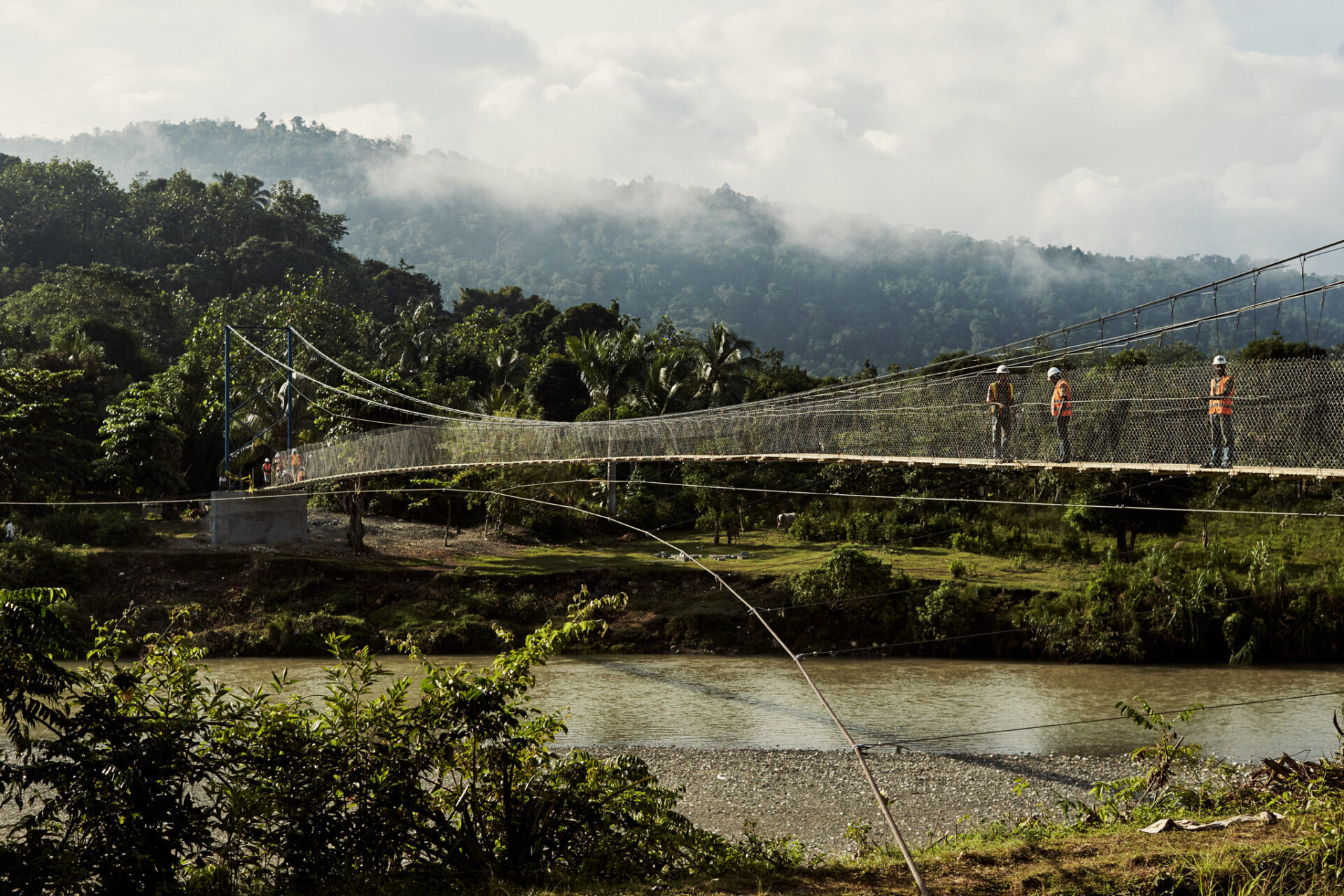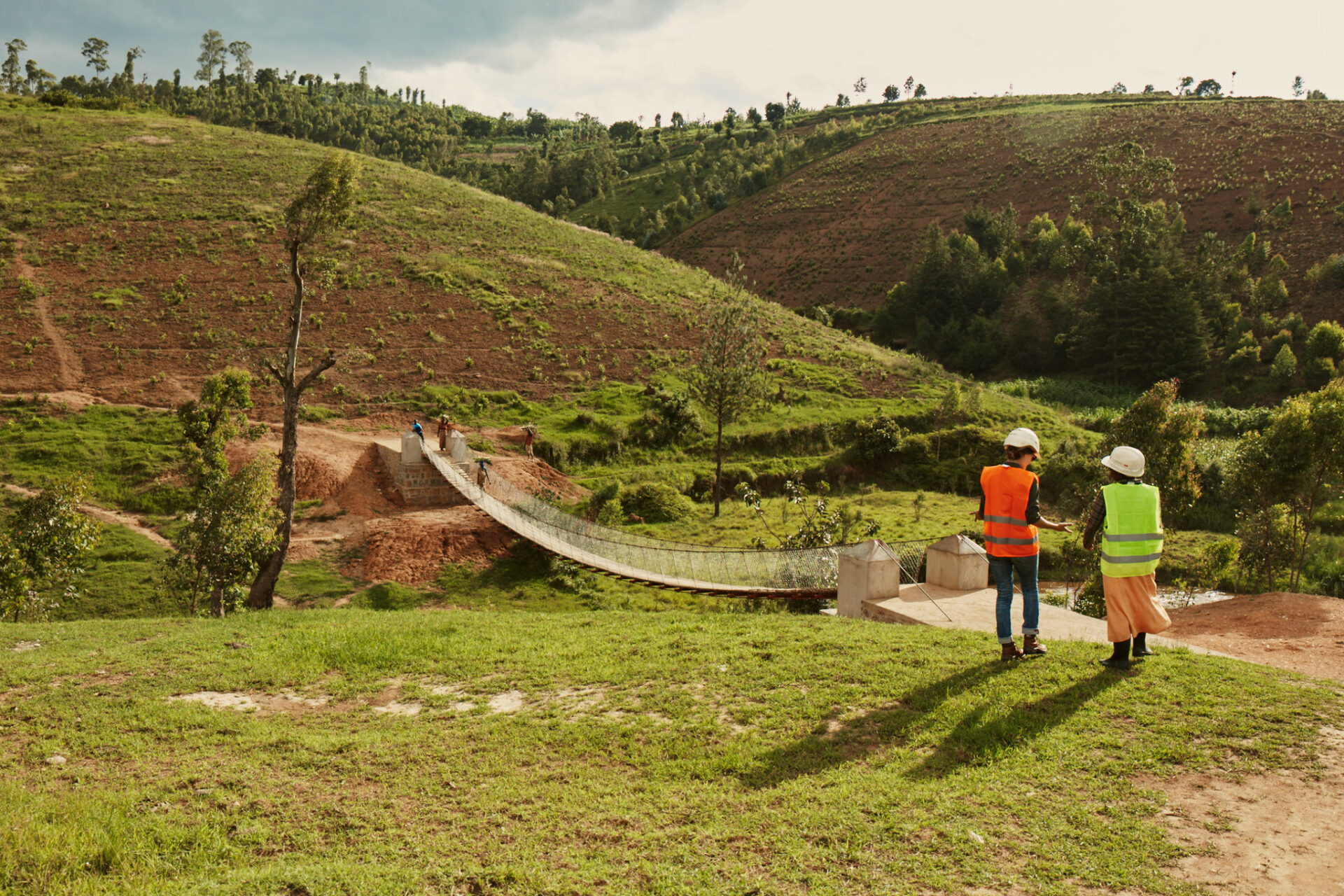
Image courtesy of Bridges to Prosperity
When Bridges to Prosperity (B2P) set out to connect people living in last-mile communities in Rwanda to critical resources, it faced significant hurdles. B2P aimed to reach 700,000 people in rural Rwanda without safe and reliable access to schools, doctors, and jobs. Village by village, the nonprofit’s staff conducted in-person surveys of the communities they intended to serve—identifying river crossings, assessing needs, and collecting requests for trail bridges. The effort took three years.
More than 250 million people globally live without access to basic needs due to poor transport infrastructure. Solving this global problem is not just the work of one nonprofit alone—it requires the skills and resources of governments, funders, nonprofits, and business. Corporate philanthropy has a unique opportunity to scale solutions to pressing social and environmental challenges like those addressed by Bridges to Prosperity.
At the Autodesk Foundation, we mitigate risks associated with advancing the mission and impact of nonprofits and early-stage companies. We bring all our resources to bear as a leading technology company with deep expertise and knowledge of the solutions and support needed to design and make a better world for all. We offer more than just a check, connecting our portfolio with in-kind resources and expertise (i.e., software donations, technical training, and employee pro bono consulting) to help organizations solve complex problems and scale solutions faster.
Co-creating between funder and grantee
Leveraging Autodesk’s in-kind support strategically for challenges as complex as last-mile access for one billion people requires intentional co-creation between the funder and the grantee. We work alongside grantees and investees to identify how to align our resources with their strategic goals early in the funding process and throughout our relationship. For example, we worked hand in hand with Bridges to Prosperity to create a Partnership Success Plan that connected our in-kind support to B2P’s 2025 strategic plan. Each pro bono initiative and technical training that B2P engaged in built on a previous one, advancing key pillars of its strategic plan.

We offer more than just a check, connecting our portfolio with in-kind resources and
expertise to help organizations solve complex problems and scale solutions faster.
Building awareness and engagement digitally
We began our engagement with B2P mere months before the entire world went on lockdown at the outset of the COVID-19 pandemic. Travel bans halted B2P’s in-country donor engagement—a key element of its fundraising efforts—and slowed potential progress on its goal of building awareness to drive systemic change.
The Foundation engaged Autodesk employee pro bono consultants to leverage their unique and strategically aligned skills to create a comprehensive recommendation to improve B2P’s virtual engagement. After conducting market and product research, the team proposed a set of solutions that included live streaming, custom webinars, a 3D modeling tool, an interactive bridge-building videogame, and virtual reality experiences.
The virtual site visit solutions not only maintained donor relations through the height of the pandemic; they also created a platform to expand engagement with government partners, potential investors, and in-country staff going forward.
Building technical capacity
Technology and training on how to use Autodesk solutions to achieve impact outcomes is one of the most powerful levers we have as a corporate foundation. At the onset of our relationship, we conducted a technical evaluation with Symetri—an Autodesk technology training partner—to determine if and how Autodesk design and engineering software could advance B2P’s work. This influenced Autodesk’s Technology Impact Program software grant of the Architectural, Engineering, and Construction Collection. B2P uses AutoCAD in its design of bridges and InfraWorks and Civil3D for strategic briefing with customers and governments.
Autodesk support has been momentous in various phases of B2P’s workflow; InfraWorks and Civil3D are used during the strategic briefing stage, while AutoCAD is essential through the preliminary design, schematic design, design development, and construction documentation phases. The suggested workflows by pro bono volunteers and the use of specific Autodesk software have helped B2P reduce the need for in-person site visits and improve bridges’ construction feasibility and cost estimation processes.
From remote site visits to remote needs assessments
Virtual site visits opened the door to the next phase of in-kind, technical support for B2P—remote needs assessments to replace time-intensive in-person surveying. Consider the time it would take to scope, on foot, larger countries like Uganda, which is nine times the size of Rwanda. B2P was eager to streamline its nationwide needs assessments.
Bridges to Prosperity collaborated on another project with Autodesk pro bono consultants, this time engaging employees with expertise in geospatial data and machine learning to support B2P’s ongoing development of a tool named “Fika Map.” Fika Map will use artificial intelligence to scale bridge building by conducting site identification, bridge type assessment, and post-build impact analysis remotely. Once live, the tool will assess trail bridge needs and estimate costs to share with potential investors and government partners for planning and prioritization. This open-source tool has the potential to go beyond site assessment to raise awareness of the impact of connected transportation infrastructure to achieve Sustainable Development Goals.
Urgent needs demand swift action
Global challenges surrounding climate change and inequality call upon all of us to act—funders, corporations, and individuals. For every $1 that the Foundation gives, we aim to pair that with $1 of in-kind support and resources from Autodesk. When leading nonprofits and startups like Bridges to Prosperity apply these resources strategically, the impact is exponential. We’re eager to see B2P’s long-term impact and growth as it scales climate-resilient infrastructure in emerging markets for the people who need it most.
Learn more about B2P’s mission to improve lives in rural communities.